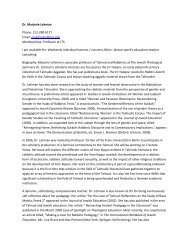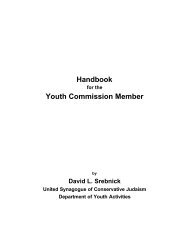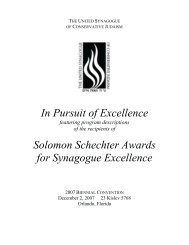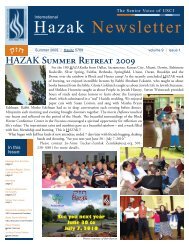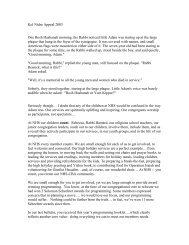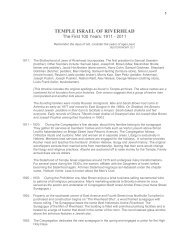Vision for Conservative Early Childhood Programs: A Journey Guide
Vision for Conservative Early Childhood Programs: A Journey Guide
Vision for Conservative Early Childhood Programs: A Journey Guide
Create successful ePaper yourself
Turn your PDF publications into a flip-book with our unique Google optimized e-Paper software.
Birkat Banim - Blessing the Children<br />
Shabbat is a perfect time <strong>for</strong> blessings, and Friday night is a time when parents<br />
traditionally have the opportunity to bless their children. The parents may place their<br />
hands on the child’s head, remembering the preciousness of each soul in their care. The<br />
boys are blessed with the words, “May God make you like Ephraim and Menashe,”<br />
Jacob’s beloved grandsons (Genesis 48:20),while the girls are blessed with the names of<br />
the four matriarchs, “May God make you like Sarah, Rebecca, Rachel, and Leah.” These<br />
blessings are followed by the priestly blessing, “May God bless and keep you. May the<br />
radiance of God’s Presence lift you and be gracious to you. May the radiance of God’s<br />
Presence shine upon you and bless you with peace.” Parents also can whisper a personal<br />
blessing to each child, creating a very special moment between them. Children also might<br />
be offered the opportunity to give a blessing back to their parents.<br />
In the early childhood setting, where the family as much as the child is the student, the<br />
blessing over the children is an important ritual to teach and rein<strong>for</strong>ce with the parents<br />
who might not know it. When parents join in the Shabbat celebration at school, they<br />
should be given the tools and the time to bless their child(ren). Provide parents with the<br />
traditional words in Hebrew, English and transliteration. Give them a copy they can take<br />
home. A nice version can be found at http://uscj.org/midcontinent/materials/kidbless.PDF,<br />
or you can copy the bottom of this page. Encourage<br />
them to try some or all of the traditional blessing. Parents also can be encouraged to offer<br />
alternative blessings from their hearts instead or in addition to the traditional ones.<br />
Teachers can create rituals of blessing in the classroom even when parents are not<br />
present. Perhaps the teacher offers a blessing <strong>for</strong> the children, and the children then offer<br />
blessings to each other and to the teacher. The goals here are multifold. They are to:<br />
• Enable parents to offer the traditional blessing to their children on Shabbat at<br />
home, and to encourage them to do so.<br />
• Create a culture of Shabbat as a time <strong>for</strong> blessings in school.<br />
• Empower children to offer blessings.<br />
The blessing:<br />
For boys:<br />
5 4$" " @<br />
<br />
For girls:<br />
( <br />
<br />
+ $ ! "-<br />
Priestly blessing, recited <strong>for</strong> all children:<br />
<br />
$ ) 4<br />
D?6!$ $0) <br />
" " $ $0) E <br />
( <br />
<br />
Yisimcha Elohim k'Ephraim v’chi-Menashe.<br />
May God make you like Ephraim and Menashe.<br />
Yisimech Elohim k'Sarah Rivka Rachel v’Leah.<br />
May God make you like Sarah, Rebecca,<br />
Rachel and Leah.<br />
Y’varechecha Adonai v’yishmirecha.<br />
Ya'er Adonai panav elecha vichunecha.<br />
Yisa Adonai panav elecha v’yasem licha shalom.<br />
May God bless you and watch over you.<br />
May God show you kindness and be gracious to you.<br />
May God bestow favor upon you and grant you peace.<br />
<strong>Vision</strong> <strong>for</strong> <strong>Conservative</strong> <strong>Early</strong> <strong>Childhood</strong> <strong>Programs</strong>: A <strong>Journey</strong> <strong>Guide</strong><br />
USCJ Department of Education<br />
Maxine Handelman<br />
Handelman@uscj.org<br />
107






